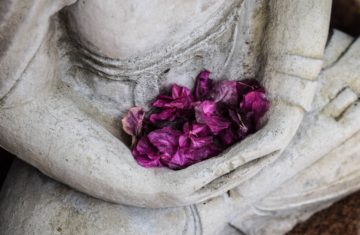There are three kinds of effort that describe the Buddhist virtue of virya, heroic perseverance. Each of them is so simple and wise, so read and digest slowly.
1. Diligent Perseverance
The first is diligent perseverance. It simply means doing the work. This form of effort protects us against laziness. Shantideva offers us this little gem: Much harm will come to those with small forbearance, who wish to have the fruit without endeavor. In other words, don’t expect the reward if you’re not willing to do the work. I’ve been in spiritual circles long enough to know that everyone wants to find the mystical quick-fix, the spiritual pill that will just get them there. But as I said in my first ever post on this blog, at the heart of Soul Ninja is the idea that our spiritual maturity depends on our practice. Like every other form of learning in the world, it doesn’t come for free, and it doesn’t come by accident. Diligent perseverance is the commitment to do the work.
Chogyam Trungpa Rinpoche called this first form of laziness “comfort orientation.” Basically, we don’t do the work because we prefer being comfortable. I bring this up specifically for those of us who are white and/or privileged. We’re learning more and more how often we have been caught in a comfort orientation. Since we don’t experience injustice personally on a daily basis, we can choose to ignore it. Often, we do. It is humbling and so important to realize that when we choose our privileged comfort, we are choosing the laziness that keeps us from being diligent in doing good. (Reminds me of the Christian scripture verse, “Do not grow weary in doing good.”)
2. Joy in Virtue
The second form of effort is described as the sense of joy we experience when we act virtuously. It’s the reward for our good efforts. This protects us from the laziness of procrastination. It’s a motivating energy. When we don’t have this, we’re, in a word, slackers. The Dalai Lama put it even more sternly when he calls it “having no wish to do good.” We are not honoring our vow to make the world better. Which doesn’t make us any better, either, by the way. We remain stuck in whatever bad patterns we’ve accumulated. Joyous effort is the form of heroic perseverance that tells us we don’t have time to mess around and do nothing. The work is too important.
Trungpa Rinpoche calls this form of laziness “loss of heart,” because it often takes the form of despondency. We tried so hard, and it didn’t work, and now we want to give up. To quote Pema Chodron, we “indulge in discouragement.” It’s such a profoundly true human feeling. I confess I experienced this deeply a couple of years ago. I wish someone had confronted me with the idea that it was a form of laziness. It would have knocked me out of my stupor much more quickly.
There’s also an aspect of this laziness that can be described as overwhelm. I’m reminded of the character Chidi on The Good Place, who is so steeped in his study of ethics that he is morally paralyzed to do anything. He can’t decide which muffin is most ethical to purchase and eat, so he wastes two hours a day worrying over it. Again, we’re called to return to the virtuous effort that brings us joy. It will protect us from getting stuck in our own mind-traps and in our excuses for why we don’t want to try anymore.
3. Tireless Service
The third and final kind of effort is the tireless effort to serve others. That’s what it means to be a bodhisattva, an awakened being. We live to serve others. It’s tikkun olam, repairing the world, in Judaism. It’s servanthood in Christianity, and submission in Islam. In Hinduism, it’s dharma, one of the four goals of life. This effort, a desire to honor and benefit others, protects us from distraction. It brings clarity to our work because we understand the heart of what we’re fighting for: our shared human dignity, our beloved community, a world that is whole and harmonious. We believe in the rightness of the work, and this keeps us committed. When we’re distracted, we lose our focus. And often, that begins when we start to look at ourselves with contempt.
Contempt is the third form of laziness because it keeps us defensive and small. We get stuck in negative thinking. We don’t feel up to helping others, much less ourselves. It’s sobering to see self-contempt as a form of laziness–and it’s a powerful antidote. When we doubt our own inherent goodness, we deny ourselves the agency to do good work in the world–work that is ours to do. When we feel this laziness, it’s a sign to return to our original goodness, our basic human goodness, and trust that we have what we need.
Trungpa Rinpoche describes this laziness “couldn’t care less.” It’s a step further than losing heart because it really takes root deep within us. When we don’t find ourselves worthy, it shows up as apathy, disdain, indifference. It’s dangerous. The antidote comes when we remember we are here to love and serve one another. Honoring the dignity and sacredness of others brings meaningful purpose to our lives.
Shantideva writes, “Through zealous effort I shall reach enlightenment.” Look for how this zealous effort arises in your practice in the forms of diligence, virtuous joy, and tireless service this month.
You can read all my posts on practicing heroic perseverance here.




